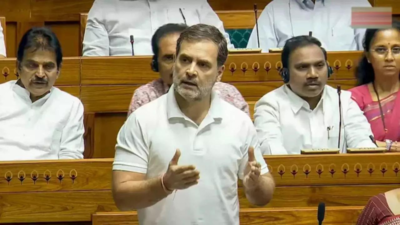
The heavy rains triggered multiple landslides in the region, leading to extensive damage to homes, roads, and agricultural land. Several villages have been cut off, and rescue operations are underway to reach those stranded. The calamity has left dozens dead and many more missing, with rescue teams working tirelessly to recover bodies and provide aid to survivors.
Rahul Gandhi, who represents Wayanad in Parliament, has been vocal about the need for immediate and comprehensive government intervention. He has called for the situation to be classified as a national disaster, which would facilitate the allocation of substantial central funds and resources for relief and rehabilitation efforts. Gandhi's appeal has been backed by local authorities and residents who are facing immense hardship due to the natural calamity.
However, the BJP-led central government has rejected Gandhi's plea. Citing UPA-era guidelines, officials have stated that the current situation does not meet the criteria for a national disaster declaration. The government has assured that adequate support is being provided through existing state and national disaster relief mechanisms.
The decision has sparked a political debate, with Congress accusing the BJP of downplaying the severity of the crisis. Critics argue that the refusal to declare the disaster as national undermines the gravity of the situation and hampers relief efforts. They claim that the affected region requires more substantial aid and quicker response times, which could be better managed under a national disaster status.
BJP officials have defended their stance, emphasizing that the guidelines in place are designed to ensure that national disaster resources are allocated in a structured and efficient manner. They maintain that the state of Kerala has been receiving necessary assistance, and efforts are being coordinated with state authorities to address the immediate needs of the affected populations.
The state government of Kerala, led by the Communist Party of India (Marxist), has been actively involved in the relief operations. Chief Minister Pinarayi Vijayan has urged the central government to reconsider its position and provide enhanced support to the state. He has highlighted the unprecedented scale of destruction and the urgent need for a coordinated response involving both state and national resources.
Amidst the political wrangling, rescue and relief operations continue on the ground. The National Disaster Response Force (NDRF) teams are working alongside state emergency services to clear debris, restore connectivity, and provide medical aid to the injured. Temporary shelters have been set up for those displaced, and efforts are being made to supply food, water, and other essentials.
The local communities have shown remarkable resilience, with many volunteers joining the relief efforts. Despite the challenges, there is a strong sense of solidarity and determination to rebuild and recover from the disaster. NGOs and charitable organizations have also stepped in, providing much-needed support to the affected families.
As the situation unfolds, the focus remains on rescuing the stranded and providing immediate relief to those in need. The long-term recovery will require significant resources and sustained efforts from both the state and central governments. The debate over the national disaster status highlights the complexities of disaster management and the importance of prompt, adequate, and well-coordinated responses to such calamities.
While the political discourse continues, the primary concern remains the welfare and rehabilitation of the affected populations. The extent of the damage and the human cost of the Wayanad landslides underline the urgent need for comprehensive disaster preparedness and response strategies to mitigate the impact of such natural disasters in the future.
